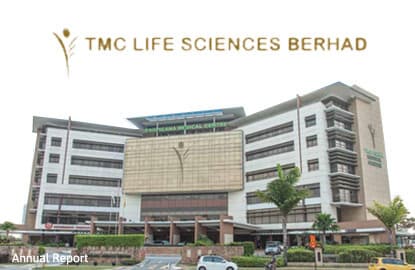
BACKED by strong shareholders, the country’s smallest listed hospital operator, TMC Life Sciences Bhd, is looking at merger and acquisition possibilities to become a regional player over the next 10 years. This is on top of its RM1.5 billion expansion plan to add 900 beds and increase its capacity more than five fold to 1,100 beds by 2019 in a bid to be a key integrated healthcare player in the domestic market.
“Since the takeover in 2010, TMC has been transformed from a loss-making company to one of the fastest growing medical groups in Malaysia. And we will not stop growing. Currently, we are looking at brownfield assets to expand our business and we hope to announce the earnings-accretive deal soon when details are firmer,” says executive director Roy Quek Hong Sheng, who took over as CEO last September.
Before joining the private sector, Quek, a Singaporean, had held senior positions in various ministries in Singapore, including the Ministry of Health, Ministry of Defence and the Prime Minister’s Office. Shares of TMC, which is 70.5%-owned by Singaporean tycoon Peter Lim Eng Hock and 7.7% by Johor Crown Prince Tunku Ismail Sultan Ibrahim, are tightly held, with a free float of 23.3%.
It is worth noting that Lim also owns Thomson Medical Centre in Singapore, a 190-bed private hospital specialising in the healthcare of women and children as well as in-vitro fertilisation (IVF). Thomson Medical was listed on the Singapore Stock Exchange until Lim took it private in 2011.
TMC, meanwhile, operates its 200-bed flagship hospital Tropicana Medical Centre in Kota Damansara and TMC Fertility Centre in Damansara Utama, which also specialises in IVF. Last year, Lim and Tunku Ismail successfully injected their 70:30 interests in the mega medical hub project in Iskandar Malaysia into TMC for RM400 million.
Dubbed Thomson Iskandar, the RM5 billion medical hub is located just 1km from the Johor Baru Customs, Immigration and Quarantine complex and will consist of the 500-bed Iskandariah Hospital, a specialist hospital, a community hospital, an education and research hub and a wellness resort. The project will be managed in partnership with Singapore’s Thomson Medical and is expected to tap the rising demand for medical tourism.
“The medical hub is strategically linked to Singapore and Indonesia and should attract a substantial number of foreign patients looking for affordable healthcare. Ageing population and strategic location aside, being operationally linked with Thomson Medical has its advantages. This means Singaporeans can use their Medisave, the republic’s national medical savings scheme, to pay their bills when they come here for treatment,” Quek says.
“Moreover, the long waiting time at public hospitals can be a pain. Alternatively, patients can just hop over the Causeway and enjoy quality healthcare services at a fraction of the cost in Singapore. Given the favourable demographic trends and our unique competitive advantages, we are bullish on the project and target to expand the proportion of revenue coming from foreigners from 10% to 25% in the next five years.”
Back in 2010, TMC was a loss-making company with a net loss of RM32.8 million in spite of the consistent double-digit growth in revenue. In the same year, Lim emerged as a substantial shareholder after he acquired a 29.6% stake from TMC founder Datuk Dr Colin Lee Soon Soo in direct business trades.
The company subsequently changed its financial year to May 31 and saw a reshuffle of its board in FY2011. Under the new management, its operating margin improved from a negative 4.1% in FY2012 to 10.3% in 12MFY2016, ended May 31. TMC changed its financial year end again to Aug 31 last October, after Quek and Jimmy Wong Yu Chee were appointed the new CEO and CFO, respectively.
For FY2016, revenue increased 24% year on year to RM127.7 million while net profit jumped 50% to RM14.9 million. Stripping out the interest income earned on its large cash pile, pre-tax profit more than doubled from RM4.9 million to RM13 million, thanks to increased patient traffic, growth in higher margin business and the optimisation of staff mix.
Although TMC is sitting on net cash of some RM200 million, it has allocated RM300 million to add 400 beds at the Tropicana Medical Centre in Kota Damansara and RM1.2 billion for Iskandariah Hospital in Johor.
It recently opened downstream retail pharmacy TMC Care Pharmacy in Vantage Bay, Iskandar Malaysia, and Quek says the company will incur significant capital expenditure for capacity expansion in FY2017.
Despite the large capex requirements and gestation period of three to five years for its additional capacity, Quek says funding is not an issue. However, he conceded that the company may need to incur additional start-up costs for long-term growth and earnings could be diluted in the event of equity-raising exercises to fund its aggressive expansion plan.
Notwithstanding the improved profitability, return on equity for 12MFY2016 deteriorated to a mere 3.5% while earnings per share fell 13% to 88 sen due to the asset injection and the enlarged share base. “Though it (earnings dilution) can’t be helped, I believe TMC is still growing fast and has a long way to go before it hits a plateau. Therefore, I urge investors to take a long-term view as we are in a good position to capture the double-digit growth of the healthcare sector,” Quek says.
Promising growth prospects and improved financial performance have been reflected in its share price performance. In the past year, TMC shares have hit new highs every three to four months and surged 57.2% to 87 sen last Thursday. The stock currently trades at a high trailing price-earnings ratio of 101.2 times, giving the company a market capitalisation of RM1.5 billion.
Save by subscribing to us for your print and/or digital copy.
P/S: The Edge is also available on Apple's AppStore and Androids' Google Play.